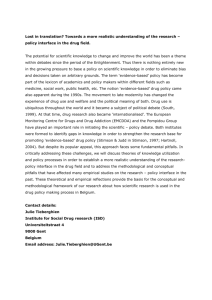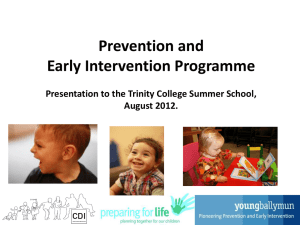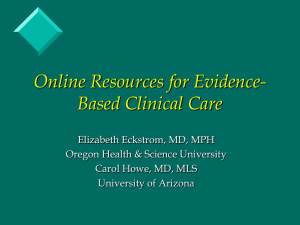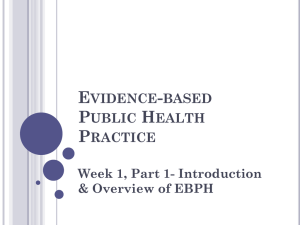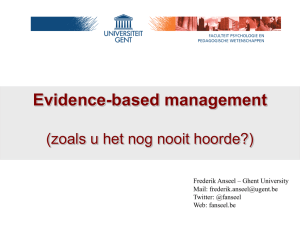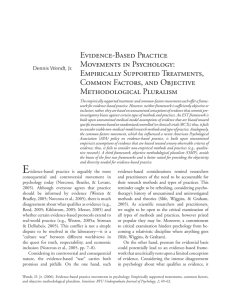File - Course E-Portfolio Psychology 444
advertisement
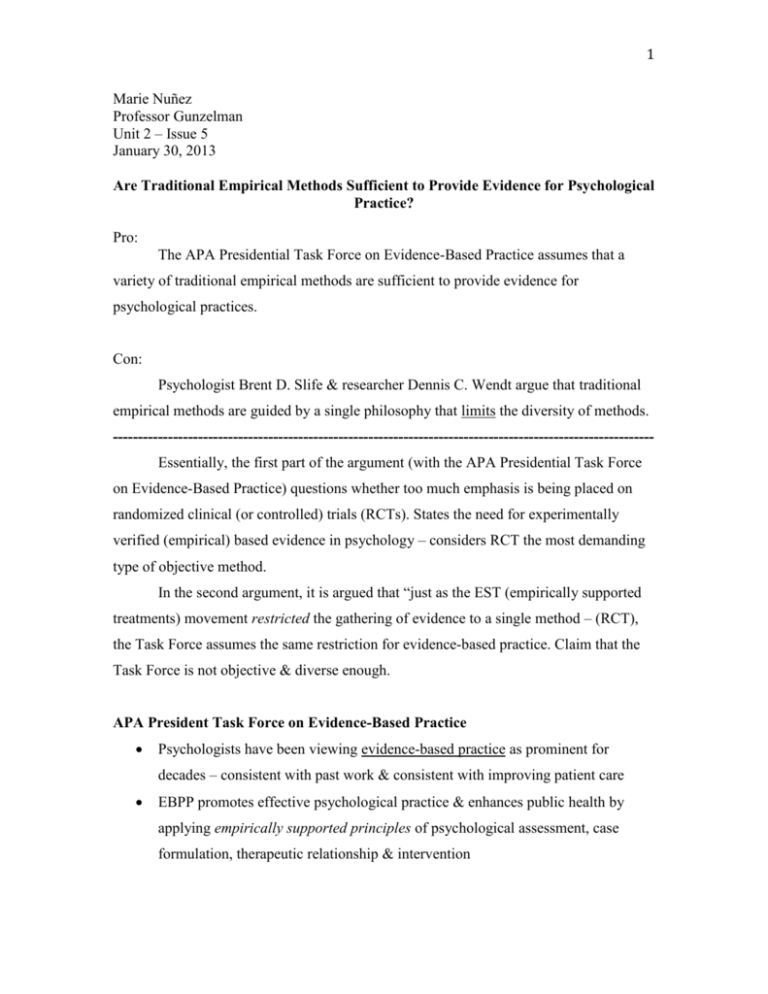
1 Marie Nuñez Professor Gunzelman Unit 2 – Issue 5 January 30, 2013 Are Traditional Empirical Methods Sufficient to Provide Evidence for Psychological Practice? Pro: The APA Presidential Task Force on Evidence-Based Practice assumes that a variety of traditional empirical methods are sufficient to provide evidence for psychological practices. Con: Psychologist Brent D. Slife & researcher Dennis C. Wendt argue that traditional empirical methods are guided by a single philosophy that limits the diversity of methods. -----------------------------------------------------------------------------------------------------------Essentially, the first part of the argument (with the APA Presidential Task Force on Evidence-Based Practice) questions whether too much emphasis is being placed on randomized clinical (or controlled) trials (RCTs). States the need for experimentally verified (empirical) based evidence in psychology – considers RCT the most demanding type of objective method. In the second argument, it is argued that “just as the EST (empirically supported treatments) movement restricted the gathering of evidence to a single method – (RCT), the Task Force assumes the same restriction for evidence-based practice. Claim that the Task Force is not objective & diverse enough. APA President Task Force on Evidence-Based Practice Psychologists have been viewing evidence-based practice as prominent for decades – consistent with past work & consistent with improving patient care EBPP promotes effective psychological practice & enhances public health by applying empirically supported principles of psychological assessment, case formulation, therapeutic relationship & intervention 2 Evidence-based practice in psychology is basically a mixture of the best available research with clinical expertise in the context of patient characteristics, culture… Three major components of : Best Available Research Evidence/Multiple Types of Research Evidence & Clinical Expertise There is a general agreement that psychological practice needs to be based on evidence & that research needs to balance internal & external validity – research will not always address all practice needs Points out that for decades, the effect or validity sizes for psychological interventions rival or exceed those of widely accepted medical treatments cannot assume that interventions that have not yet been studied in controlled trials are considered ineffective (simply untested – nor effective or ineffective) Evidence based practice requires that psychologist recognize the strengths & limitations of evidence obtained from diff. types of research o Treatment method, individual psychologist, treatment relationship & patient are all vital contributors to the success of psychological practice Clinical expertise is essential when it comes to identifying & integrating best research evidence with clinical data (like information about the patient obtained over the course of treatment) Experts – knowledgeable, adaptable, recognizes mistakes, continue to learn, but not trustworthy (due to bias, errors and so forth) Understanding expertise in clinical practice as a way of enhancing patient outcomes is important In order to treat multiple symptoms – it is important to know the person who has the disorder in addition to knowing the disorder the person has. Evidence-based practice in psychology (EBPP) seeks to maximize patient choice among effective alternative interventions Effective practice requires balancing patient preferences & the psychologist’s judgment, based on available evidence & clinical expertise in order to determine the most appropriate treatment. Main message: the general agreement (among sciences, clinicians etc.) that EBPP requires value of multiple sources of scientific evidence. 3 The scientific method is a way of thinking & observing systematically & is the best tool we have for learning about what works for whom. Clinical decisions should be made in collaboration with the patient & other factors Treating psychologist makes the ultimate judgment regarding a particular treatment plan – involvement of patient is crucial, but should never be responsible for treatment decisions Ongoing monitoring of patient progress & adjustment of treatment is crucial for EBPP Goal is to set a guideline for the next steps in the evolution of EBPP Brent D. Slife & Dennis C. Wendt on Evidence-Based Practice Movement What qualifies as evidence? This controversial question is not a simple scientific dispute that can be resolved in the lab – “culture war” Approaches that have been attempted to address the question of deeply held worldviews and political passions have been well intended, but inadequate. o Two major steps in this regard is the EST (empirically supported treatment) & “common factors” approach EST Movement – thought to correct issue of the battle of worldviews through “rigorous scientific evidence” – issue w/ this = psychologists found their practices being shaped by this RCT “test” – basically practices were accommodating the RCT perspective on treatments, therapists & patients RCT manualization of treatments hindered important therapeutic factors like genuineness, creativity, motivation & emotional involvement Biases of RCTs (randomized clinical or controlled treatments) shaped one’s view of the patient - RCTs are limited to patients with textbook symptoms of a (single) DSM disorder – what if you have a patient that has a mixture of disorders? Excludes other types of therapy like humanistic & psychodynamic therapies Common factors approach – an attempt to learn from the shortcomings from the EST movement – however, this approach is not objective & diverse enough “We applaud the goals, but criticize the implementation” 4 Common factors approach to the evidence controversy is a clear advancement of the EBP project, but it is not a definite advance There can be a framework for understanding evidence that does not automatically shape practice before it is investigated o We not only need a diversity of methods, but we also need a diversity of methodologies or philosophies underlying these methods o Pragmatism notion – we should never approach the study or understanding of anything with fixed schemes and methods. (By doing this we are taking a risk of the method itself distorting understanding of the situation being studied) o Can go in with a sort of framework, but framework doesn’t have to be cast in stone – should allow the occurrence itself to guide the methods we choose to study APA’s version of EBPP is method-driven rather than being object-driven Reference: APA Presidential Task Force, Slife, B. D., & Wendt, D. C. (2013). Are Traditional Empirical Methods Sufficient to Provide Evidence for Psychological Practice? In B. Slife (Author), Taking Sides (17th ed., pp. 68-88). New York, NY: McGraw-Hill.

